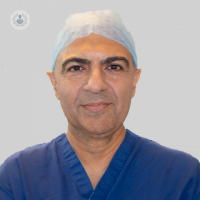which lens do I choose?
Escrito por:The power of your chosen lens implant can determine the distance at which you can see most clearly after your operation. For most people, the aim is to give clear long-distance vision after the procedure, with glasses being required just for reading. However, in others, it may be more appropriate to match the spectacle prescription of the other eye.
We asked Mr Sundeep Kheterpal, an expert consultant ophthalmologist based in the Thames Valley, to explain how a surgeon would calculate the strength of a lens implant and which types of lenses will offer the clearest vision. Here’s what he had to say.

How do you calculate the strength a lens needs to be?
We calculate lens strength by measuring certain components of the eye with the latest scanning technology. By using multiple formulas in accordance with the latest international recommendations, we can get the most accurate results.
In general, lens calculations are very accurate, but it's important to note that they are always based on formulae and data from other operations, and in individual cases, there may be a variation that isn't always the expected outcome. Therefore, some people will still need to wear spectacles for long- and short-distances to get the clearest vision.
Individuals with high prescriptions, irregular corneas or astigmatism have a higher chance of still needing a spectacle prescription afterward.
What type of lenses are on offer?
We use only the highest calibre lenses from the world’s best manufacturers; such as AMO, Alcon and Zeiss.
You may wish to consider a multifocal lens which is rather like wearing varifocal glasses (continuous vision for all distances). These lenses can provide very clear long- and short-distance vision that significantly reduces your dependence on spectacles.
Toric lenses can reduce pre-existing astigmatism and reduce the strength of spectacles required after surgery.
- Standard lens (monofocal aspheric)
These standard lenses provide high-quality vision at a single distance, which is usually set at long-distance but may be set at near if preferred. Glasses are then required to correct the other distances. If both eyes are set at long-distance then glasses are required for any kind of work that is up close, e.g. computer or desk work. If both eyes are set at short-distance then glasses are needed to see objects in the distance and driving.
Often one eye can be set at long-distance and the other at short-distance. This is known as monovision. You won't need your glasses that often, however, you may need a top-up glasses prescription for the cinema, night driving and prolonged computer work and reading.
- Multifocal and EDOF (extended depth of focus) lenses
This lens is made of multiple segments or concentric rings. It gives you the potential to see clearly in the distance and for close objects.
The results from this lens are only obtained by having a thorough eye examination to ensure that your eyes are suitable. The best technology needs to be used for this surgery and the surgeon needs to accurately calculate the formulas before. Due to the meticulous nature of this procedure, the surgeon needs to be highly trained in using these lenses and take into account all the issues that could arise and cause inaccurate results.
Can you have lenses if you've previously undergone laser eye surgery?
If you've had laser eye surgery in the past (Lasik, Lasek, PRK, SMILE) it can cause problems with the quality of your vision and the accuracy of lens implant calculations.
Surgery or laser to the cornea alters the accuracy of lens implant calculations giving a higher chance of over or under correcting the end focal length. Therefore, there is a higher chance of repeat or revision surgery being required. This is why it is often advised to use monofocal clear lens implants rather than multifocal lenses, as complex visual irregularities can occur.
If you are interested in getting lenses, visit Mr Sundeep Kheterpal’s Top Doctors profile and check his availability.


